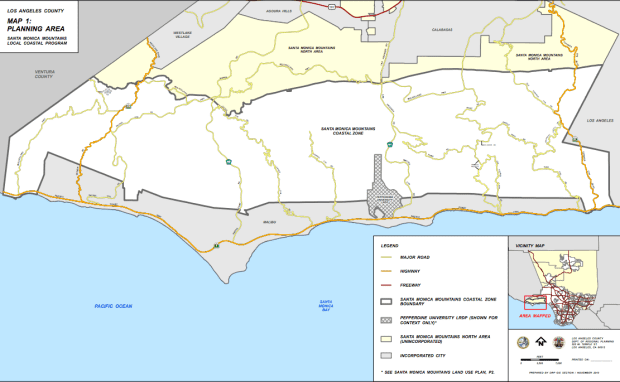
County Super visor Zev Yaroslavsky is defending a new local coastal program (LCP) for the Santa Monica Mountains and unincorporated Malibu that has some stakeholders up in arms over what they see as restrictions on equestrian uses and agriculture, including vineyards.
Yaroslavsky and his LA County Board of Supervisor colleagues voted 4-0 on Feb. 11 to OK the hefty 800-page plan, which still needs approval from the California Coastal Commission (CCC). The LCP runs adjacent to Malibu city limits, covering unincorporated areas of the Santa Monica Mountains within LA County’s coastal zone—an area of about 80 square miles. The plan would make the county the sole authority on development and construction projects in the Santa Monica Mountains.
In the absence of an LCP, the area has been operating under a Malibu Land Use Plan (LUP) certified by the Coastal Commission in 1986.
Although the LCP was written and approved by the county back in 2007, it never went to the CCC for final approval, with the county continuing to make changes in subsequent years and gather more stakeholder support.
But opponents of the LCP still believe it fails to provide adequate protections on current and future equestrian uses.
During a meeting on March 9 at Calamigos Ranch, Recreation & Equestrian Coalition President Ruth Gerson expressed her dismay.
“Traditional equestrian uses have not been protected by the LCP, such as boarding, how many horses can be on a property, depending on its slope…and emergency preparedness,” she said.
Gerson said Yaroslavsky had not discussed any changes of equestrian uses with the community since 2007.
“If it’s a new plan, then it’s supposed to have a new set of workshops to go along with it…The LCP is hard to read, is 800 pages long and has a lot of inconsistencies,” she said.
According to Yaroslavsky, the LCP “specifically supports the riding, boarding and training of horses” and increases the number of areas where the uses are allowed. Homeowners are also allowed to keep horses in their backyard.
At the same Calamigos meeting, Don Schmitz, a land use consultant and resident who owns a winery, gave a presentation titled “Severing a Malibu Tradition.” In it, he claimed the LCP would “completely do away with agriculture in the Santa Monica Mountains.”
“The LCP is trying to nail this down and make it the law,” Schmitz argued, “which makes it more restrictive than the Coastal Act itself.”
Yaroslavsky, however, said existing agricultural uses will be grandfathered in and allowed to continue, just not allowed to expand. He explained the Coastal Commission, with rare exceptions—not the county—has prohibited new vineyards since the early 2000s based on an informal rule known as the Dixon Memo, which declares all of the Santa Monica Mountains an Environmentally Sensitive Habitat Area (ESHA).
Fed up with the opposition, Yaroslavsky last week wrote a blog titled “Exposing a mountain of deceit,” accusing a “small army of lawyers and lobbyists” representing clients that “didn’t want to play by the rules” and launching a misinformation campaign.
He clarified that horses would not be banned, the LCP is not being “rammed through,” the mountains would not be commercialized, the LCP would not cover the City of Malibu in any way, backyard gardens, vineyards and dogs would not be banned, and no LCP fees or costs would be added.
“These people are only trying to delay it so they can kill the plan. The stakes are very high for this generation and future generations,” Yaroslavsky said.
He was further frustrated that several groups that had signed documents of support prior to the board passing the LCP last month “did an abrupt about-face after its approval, even though their concerns had been addressed in full.”
“I’ve spent 35 percent of my years here trying to get this issue resolved,” Yaroslavsky said. “The Coastal Act was created in the ’70s, and we still don’t have an LCP. Forty years is long enough to wait. Delay in this case means failure.”
All concerned home/horse owners are invited to a meeting with Planning Deputy Ben Saltsman on Friday, March 21, at 25575 Piuma Road in the Monte Nido neighborhood. The Coastal Commission is scheduled to vote on the LCP during its April 9-11 meeting in Santa Barbara.
